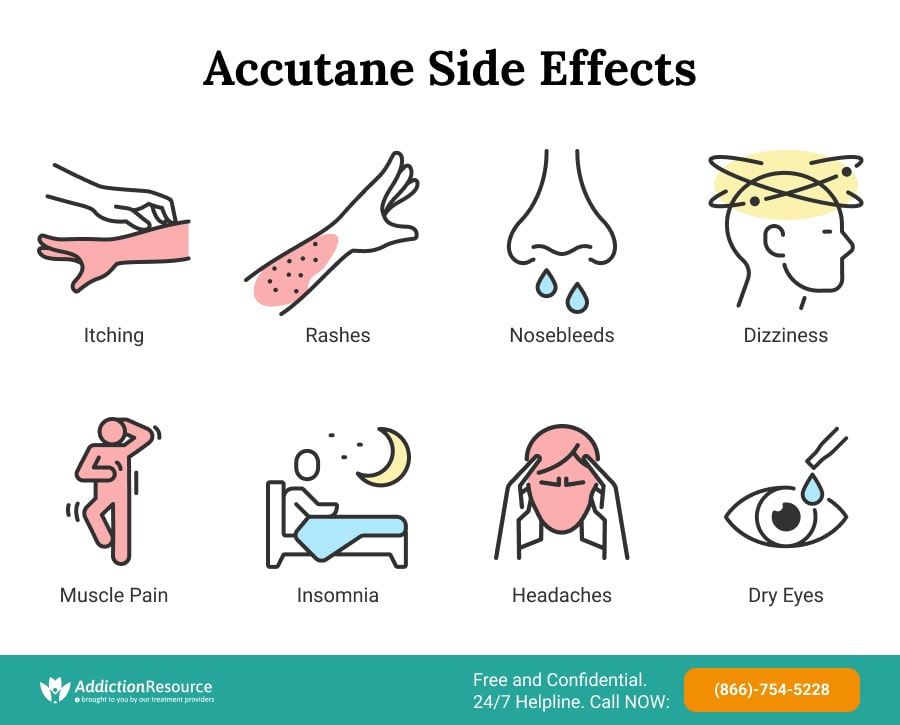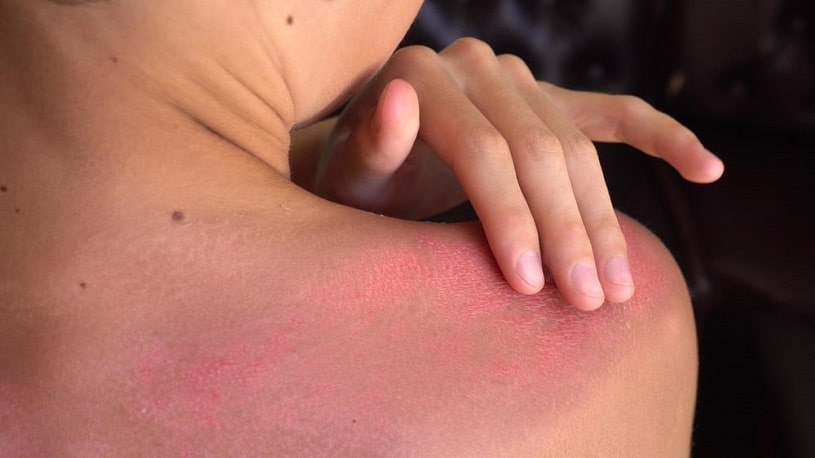Accutane is a brand name for Isotretinoin, a drug used as a last line of defense in the treatment of severe acne. It’s a Vitamin-A derivative that usually comes in gel capsules.
Table Of Contents:
In most of the cases, Accutane side effects are possible and can become a real health problem. That is why physicians don’t prescribe this drug unless all other treatments, including antibiotic courses, have not shown any results. The doctor and the patient must have all the information to weigh out the pros and cons and the possibility of developing adverse health effects before taking the drug itself. Moreover, due to Accutane birth defects, women are forbidden to get pregnant while taking this medication.
Learn more about potential problems caused by isotretinoin, and the associated risks.
Isotretinoin Side Effects
Many physicians and skin specialists are hesitant to prescribe the drug. That is because there’s a tendency for people to develop severe adverse health reactions. Even the common isotretinoin side effects can be extremely uncomfortable to deal with, which is why they are even printed in detail in the leaflet that comes in the packet. There needs to be considerable deliberation both from the doctor’s end and the patient’s end to ensure that the treatment should be used. The patient needs to have information about all the isotretinoin side effects. Especially when the patient is in their teenage years because teenage acne does clear out on its own by the end of puberty and probably doesn’t need heavy medication like this one.
It’s also important to note that the patient might not get their acne cleared taking this drug. As soon as they stop, they can experience an Accutane relapse and repeat their course.
Roche is a manufacturer of the drug. They list the Accutane side effects in the product leaflet that’s included with the drug. There are two types of Accutane side effects, those that are considered “mild” or “common.” These side effects of Accutane can be extremely uncomfortable but are still bearable and can be minimized using a few countermeasures.
Mild Adverse Reactions Are:
- Extremely dry skin
- Itching (brought on by the dryness)
- Rashes
- Dry lips
- Cracking in the corner of the mouth
- Dry nose and nosebleeds
- Peeling or cracking skin
- Dry eyes
- Dizziness
- Joint pain
- Muscle pain
- Heightened anxiety
- Brittle nails
- Insomnia
- Headaches of varying intensities
The second type of side effects of Accutane are the ones that are on the more extreme side. These severe symptoms can even cause problems in the long term.
These Include:
- Increased cholesterol
- Extreme joint pains
- Organ damage
- Increased pressure on the brain
- Vision impairment
- Blood sugar problems
- Low white blood cells count
- Low red blood cells count
- Mental health issues (especially extreme depression)
- Severe birth defects
The intensity of the symptoms caused by this drug varies from person to person. However, these are some potential isotretinoin side effects that patients need to be aware of before they start medical treatment using this drug.

Skin Conditions
One of the most common symptoms is that while the medication clarifies the skin, the patient develops other skin conditions. These can be short-term conditions or long-term.
People using this drug might become more sensitive to UV light than they usually were, which increases their chances of getting sunburns. Therefore, the patient must use sunscreen on all parts of their body exposed to direct sunlight. It helps protect their skin as much as possible.

Since Accutane can significantly dry out the skin, it ultimately makes it more susceptible to scarring too. That is why it’s advised not to pick at the scars or acne at all. The skin can also become very fragile, which makes it more prone to breaking or tearing. Therefore, it’s recommended that the patient avoid things that can cause skin stress or lead to it tearing. This would include waxing, as the intensity of the wax might end up pulling the skin altogether.
Furthermore, patients might develop other skin problems like painful hives or eczema. It is advised that the patient uses heavy lip balm, face, and body creams to minimize the dryness of the skin, which would lessen the intensity of the side effects on the skin.
Change in Levels of Cholesterol and Lipids
During clinical trials, 25% of patients experienced an increase in triglycerides. In addition, 15% experience a decrease. Finally, 7% experienced an increase in the bad kind of cholesterol. Patients who are obese, have diabetes, have a lipid metabolism disorder, or have a high level of alcohol intake are especially at risk. Therefore, it requires regular screenings.
Inflammatory Bowel Disease
Patients with a prior history of this condition are at risk. Furthermore, in some cases, the symptoms persisted after discontinuing the use of the drug. Accutane side effects include severe diarrhea, abdominal pain, or rectal bleeding.

Increased or Decreased Bone Mineral Density
These changes include hyperostosis. It is a hardening of ligaments where they attach to the spine. Also, there is premature epiphyseal closure. It is the stunted growth of the skeleton before adulthood. In rare cases, patients experience arthritis and calcium deposits in soft tissue.
Visual Impairment
Some patients encounter a clouding of the cornea as one of the Accutane side effects. This is the transparent layer on the outside of the eye. Certain patients suffered from diminished night vision. Moreover, in some cases, the onset was sudden. The manufacturer warns patients to take extra care when driving at night.
The patient might end up getting cataracts, impairing their vision. In addition, dry eyes could lead to conjunctivitis (also known as pink eye) and photophobia.

Because of the increased dryness, it’s also advised that the patient refrains from wearing contact lenses during treatment.
In rare cases, patients develop color blindness. In addition, optic neuritis (inflammation that causes damage to the optic nerve) may occur. Consequently, it can result in permanent damage to vision.
Cardiovascular Conditions
Some patients report tachycardia (increased heart rate), palpitations, and thrombotic vascular diseases. It involves the formation of blood clots that obstruct blood flow. Furthermore, severe cases have resulted in strokes, as Accutane side effects.
Accutane Purge
As this drug works to change the skin and pores work, the ones that cause the acne in the first place, it is possible that before the skin gets better, the patient experiences a significant flare-up of acne instead. This flare-up is commonly known as “The Accutane purge.”
About 5-25% of patients end up sharing the “purge” or the temporary worsening of acne before things get better.
There are ways to lower the risk of the Accutane purge from happening in the first place. These would be measures like starting at a low dose, getting different treatments for the purge itself, and trying out a topical solution for help. In most patients, the initial flare-up does clear up fairly soon. A general purge or outbreak lasts around six weeks. If it lasts longer than that, the dosage might need to be adjusted.
Psychiatric Disorders Associated with Accutane
The mechanism by which it causes psychiatric disorders is unknown. A 2016 paper in the Journal of the American Academy of Dermatology suggests that everybody on Accutane treatment be screened for depression:
Regardless of whether depression in these patients is rooted in the underlying acne or its treatment, the prevalence and serious nature of depression, suicide, and suicidal ideation demand attention
Accutane Birth Defects and Use in Pregnancy
The essential fact everybody should be well aware of is that Isotretinoin is a teratogenic substance. Teratogenic means that it disturbs the growth and development of an embryo or fetus, also known as Accutane birth defects.
According to the FDA’s pregnancy drug categorization system, it is a category X drug, which means it is proven to cause high congenital disabilities in babies whose mothers used this substance during pregnancy, called an “Accutane baby”. Accutane birth defects can set in in the Accutane baby as soon as the first weeks of pregnancy, even before the mother knows she’s carrying a child.
Recent Data Suggest That It Has an Incidence Rate of Circa 42% Of Neonatal Defects, Which Include:
- Facial and oral malformations – Cleft Palate and Cleft Lip
- Heart defects which persist during the baby’s whole life
- Eye abnormalities
- Ear abnormalities
- Hydrocephalus – vast fluid spaces in the baby’s brain
- Microcephaly – abnormally small head and brain
- Central nervous system malformations, which can result in intellectual and mental disabilities
- Abnormality of the thymus gland
- Parathyroid hormone deficiency
Any fetus exposed to it during pregnancy can be affected. Miscarriage, premature delivery, and infant death are also very common in an Accutane baby.
iPLEDGE Program
The U.S Food and Drug Administration instituted this program in 2005 to make sure the drug is not prescribed to pregnant women and that no one becomes pregnant during the treatment.
Women Under the IPLEDGE Program Should Respect the Following Rules While Using Accutane:
- Consult your doctor before using it
- Be acutely aware of the risks of taking it
- Before starting the medication, women should have two negative pregnancy tests
- Accutane users should use effective birth control methods at least one month before and after their treatment due to the Accutane half-life timeline.
Accutane: Worth Going Through the Side Effects?
Most people that try Accutane as acne treatment end up getting good results at the end of treatment. However, the journey through the treatment itself is usually not very easy. There are many mild to severe symptoms the patient may experience that they need to have information about before the treatment starts to ensure that they know the effects the drug can have on their mental health and physical health.
The patient should also make sure to consume the dose their doctor or medical health professional has prescribed and be monitored throughout the treatment so the doctor can adjust the dosage as necessary. With proper medical attention and information, the patient should be able to navigate through the side effects and get their acne treated successfully.
Frequently Asked Questions
Does Accutane Make You Gain Weight?
Although there’s frequent mention of Isotretinoin causing weight gain or weight loss, the FDA has not confirmed this to be a side effect thus far. Therefore, the patient can follow a regular healthy diet without worrying about weight gain brought on by the drug.
Does Accutane Make You Tired?
Fatigue or excessive sleepiness isn’t a side effect of Isotretinoin that everyone goes through, but some people have reported feeling more tired than usual while taking the drug.
Does Accutane Stunt Growth?
Studies have shown that the use of Accutane in teenagers can stunt their growth early prematurely. In adults, it can also cause other bone changes. That is why it’s advised that the teenager waits out their hormonal “teenage” acne to go away on its own rather than trying Isotretinoin while they’re still growing.
Can Accutane Cause Cancer?
This drug was initially developed as a chemotherapy drug. However, it does not cause cancer just by consumption. It’s been reported that it can prevent certain cancers instead!
Does Accutane Cause Hair Loss?
Accutane fights acne by altering the way the pituitary glands work. It works wonders when it comes to acne, but it can affect hair growth. As a result, some people experience hair loss; others tend not to experience enough loss for it to count. Although, as long as the patient isn’t using extremely high doses, their general hair growth in the long term should be fine.
Does Accutane Cause Depression?
Depression has been listed as a side effect on the leaflet it comes with. Although there’s been debate about it causing depression, it wasn’t until recently that a study showed that there might be a possible link between this drug and the part of the brain that are usually associated with depression. As a result, the patient may be at higher risk for depression while using this drug.
Hope Without Commitment
Find the best treatment options. Call our free and confidential helpline
Most private insurances accepted
Page Sources
- ACCUTANE® (isotretinoin capsules), U.S. Food and Drug Administration, https://www.accessdata.fda.gov/drugsatfda_docs/label/2008/018662s059lbl.pdf
- Layton A. (2009). The use of isotretinoin in acne. Dermato-endocrinology, 1(3), 162–169. https://www.ncbi.nlm.nih.gov/pmc/articles/PMC2835909/
- Oliveira, J. M., Sobreira, G., Velosa, J., Telles Correia, D., & Filipe, P. (2018). Association of Isotretinoin With Depression and Suicide: A Review of Current Literature. Journal of cutaneous medicine and surgery, 22(1), 58–64. https://pubmed.ncbi.nlm.nih.gov/28705050/
- Wooltorton E. (2003). Accutane (isotretinoin) and psychiatric adverse effects. CMAJ : Canadian Medical Association journal = journal de l'Association medicale canadienne, 168(1), 66. https://pubmed.ncbi.nlm.nih.gov/12515789/
- DiGiovanna J. J. (2001). Isotretinoin effects on bone. Journal of the American Academy of Dermatology, 45(5), S176–S182. https://pubmed.ncbi.nlm.nih.gov/11606950/
- Moshell A. N. (1989). Prevention of skin cancer in xeroderma pigmentosum with oral isotretinoin. Cutis, 43(5), 485–490. https://pubmed.ncbi.nlm.nih.gov/2721244/
- Karadag, A. S., Ertugrul, D. T., Tutal, E., & Akin, K. O. (2011). Isotretinoin influences pituitary hormone levels in acne patients. Acta dermato-venereologica, 91(1), 31–34. https://pubmed.ncbi.nlm.nih.gov/21103844/
- İslamoğlu, Z., & Altınyazar, H. C. (2019). Effects of isotretinoin on the hair cycle. Journal of cosmetic dermatology, 18(2), 647–651. https://pubmed.ncbi.nlm.nih.gov/30350907/
- Ludot, M., Mouchabac, S., & Ferreri, F. (2015). Inter-relationships between isotretinoin treatment and psychiatric disorders: Depression, bipolar disorder, anxiety, psychosis and suicide risks. World journal of psychiatry, 5(2), 222–227. https://www.ncbi.nlm.nih.gov/pmc/articles/PMC4473493/
- Falk, E. S., & Stenvold, S. E. (1992). Long-term effects of isotretinoin in the treatment of severe nodulocystic acne. Rivista europea per le scienze mediche e farmacologiche= European review for medical and pharmacological sciences= Revue europeenne pour les sciences medicales et pharmacologiques, 14(4), 215-220. https://pubmed.ncbi.nlm.nih.gov/1305994/
- Lestringant, G. G., Frossard, P. M., Agarwal, M., & Galadari, I. H. (1997). Variations in lipid and lipoprotein levels during isotretinoin treatment for acne vulgaris with special emphasis on HDL‐cholesterol. International journal of dermatology, 36(11), 859-862. https://pubmed.ncbi.nlm.nih.gov/9427082/
- FDA, The Pharmacist Guide For the iPLEDGE Program https://www.fda.gov/media/86131/download
- Choi, J. S., Koren, G., & Nulman, I. (2013). Pregnancy and isotretinoin therapy. CMAJ, 185(5), 411-413. https://www.ncbi.nlm.nih.gov/pmc/articles/PMC3602257/

 Authored by
Authored by  Reviewed by
Reviewed by 

